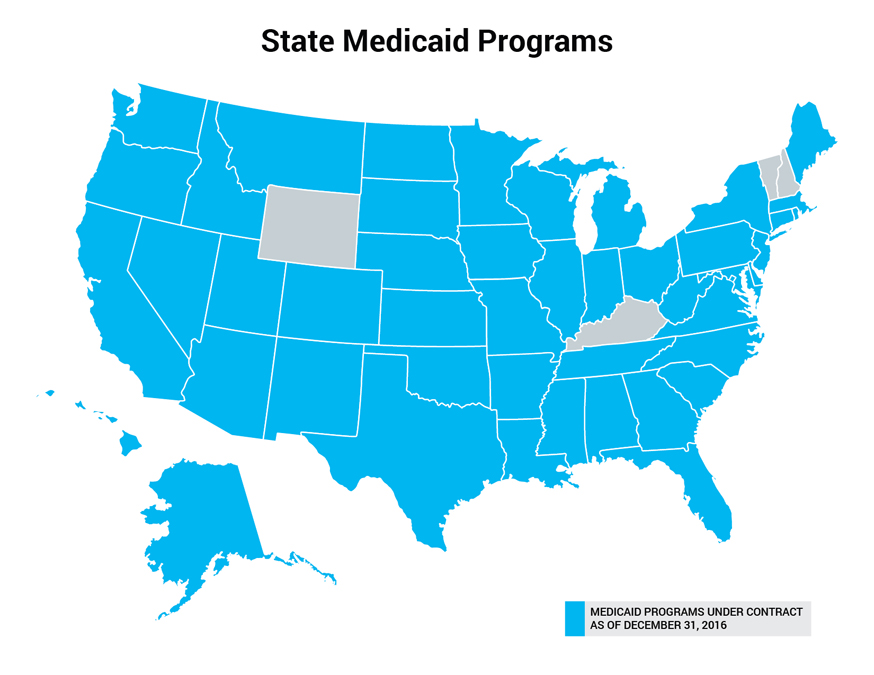On Friday, four days after the swearing in of new Health and Human Services Secretary Alex Azar, the agency signed off on Medicaid work requirements in a state where Azar’s old company is a subcontractor paid to help the state keep its Medicaid costs down.
The company, Health Management Systems (HMS), works with both the public and private sector to lower health costs, typically by shifting them to third parties such as insurance companies, and sometimes, patients themselves. Azar, the former head of Eli Lilly’s U.S. subsidiary, sat on the HMS board of directors from October 2016 through November 2017, when President Trump nominated him to run HHS.
In May 2017, Indiana asked the agency to let the state impose work requirements on its Medicaid beneficiaries. Azar traveled on Friday to Indiana and announced the approval for the waiver.
Indiana’s Medicaid website names HMS as a subcontractor that audits Medicaid payments. The contract took effect last summer and lasts through June 2021. It does not name HMS but says that the audit subcontractor will receive 13 percent of recovered funds as compensation.
At the time Azar stepped down from HMS, he reported having between $115,000 and $300,000 worth of HMS stock and stock options. His ethics letter to the Senate for his confirmation process said he would divest himself of all HMS stock and options within 90 days of his confirmation, which was January 24.
Azar’s letter also said that for 90 days after his confirmation he would not participate in any matter that has a “direct and predictable effect” on HMS financial interests. He said he would recuse himself for one year from any matters in which he knows HMS “is a party or represents a party.”
In an emailed statement to TYT, HHS responded to questions about Azar’s finances and involvement in Medicaid waivers, which are issued by the agency’s Centers for Medicare and Medicaid Services (CMS). Matt Lloyd, an HHS spokesperson, said, “Before entering government service, the Secretary divested all of his financial interest in HMS. HMS is not a party to the Indiana Medicaid waiver nor does it represent any party to that waiver. Accordingly, under his ethics agreement, and federal law, the Secretary may participate in the Indiana waiver. In addition, the Indiana waiver was actually approved by the Principal Deputy Administrator of CMS, not the Secretary.”
HMS may not be a party to the waiver, but it’s not clear whether waivers will affect the company. HMS in its annual report last summer published a map showing it has “Medicaid programs under contract” in Indiana and almost every other state.

Source: HMS FY 2016 annual report
Some industry analysts have already suggested HMS could benefit from Medicaid waivers.
On a conference call with Wall Street analysts last May—as Indiana and other states sought Trump administration approval for new Medicaid restrictions—HMS was asked specifically about the profit potential in helping states impose work requirements.
“I think you do some modest work and work requirement aspects of Medicaid, things of that nature,” one analyst said to HMS CEO William Lucia, according to a transcript on SeekingAlpha.com. “So is there a potential that these waivers open up totally new state government opportunities for you as well?”
Lucia said, “Well, it’s possible. We do some, we consider, eligibility-related work. Of course, we’re working with states to focus on bringing any of that work in early in the process, and of course, also talking to the federal government about that, right? . . . So there is always potential for additional opportunity when it comes to eligibility-related services. We don’t necessarily do outreach to members today to ask them whether they’re working or not, but clearly, we have a very sophisticated outreach program that we’ve recently acquired and could do that if that was an opportunity.”
In September 2014, HMS submitted a letter encouraging CMS to approve an earlier Indiana waiver request, part of the state’s response to Obamacare’s expansion of Medicaid. The waiver Azar announced on Friday is an extension, adding unemployment as a reason to disqualify Medicaid recipients.
Azar’s work at HMS was not explored during his confirmation hearings before two Senate committees. Reducing health-care costs is a core component of Azar’s mission at his new agency, but as TYT previously reported, HMS primarily works to shift health costs onto third parties.
In his January 9 Senate confirmation hearing, Azar dismissed the notion that he wanted to impose work requirements on “able-bodied” adults. Last July, however, while Azar sat on the HMS board, the company’s in-house lobbyist wrote to CMS urging approval for a Wisconsin waiver request that included work requirements.
HMS’s lobbying firm is Tarplin, Downs & Young. All three partners worked previously for HHS. The lobbying firm’s latest disclosure filing lists Jennifer Young as one of those lobbying CMS about eligibility issues on HMS’s behalf. Young’s HHS stint overlapped with Azar’s previous tenure at the agency, when he served in high-ranking roles there under President Bush.
Now back at HHS after several years at Eli Lilly’s Indiana headquarters, Azar reportedly has made ethics a priority. On Wednesday, Azar accepted the resignation of Centers for Disease Control and Prevention Director Brenda Fitzgerald, following a Politico report that she traded in tobacco stocks during her CDC tenure. Fitzgerald’s work on other issues—including cancer and the opioid crisis—had also been limited by other financial dealings.
CMS Principal Deputy Administrator Demetrios Kouzoukas, who signed off on Indiana’s waiver request, served as HHS deputy general counsel from 2003 to 2008, and principal associate deputy secretary in 2009. Azar was HHS general counsel from 2001 through 2005, after which he was confirmed as HHS deputy secretary.
CMS Director Seema Verma reportedly recused herself from the Indiana waiver request, because she helped formulate it as an Indiana health advisor to then-Gov. Mike Pence.
Last February, the Associated Press reported that Verma advised Gov. Pence on the state’s health policies while simultaneously working for private companies with financial stakes in those policies.
Pence and Verma implemented Indiana’s earlier round of Medicaid waiver requests in 2015. According to Kaiser Health News, 25,000 Indiana residents lost their Medicaid coverage over the next two years. Half of them eventually found other coverage.
The state reportedly estimates another 33,000 will lose coverage under the new restrictions.
Follow TYT Investigates on Twitter, Facebook, and YouTube to stay on top of exclusive news stories from The Young Turks.


